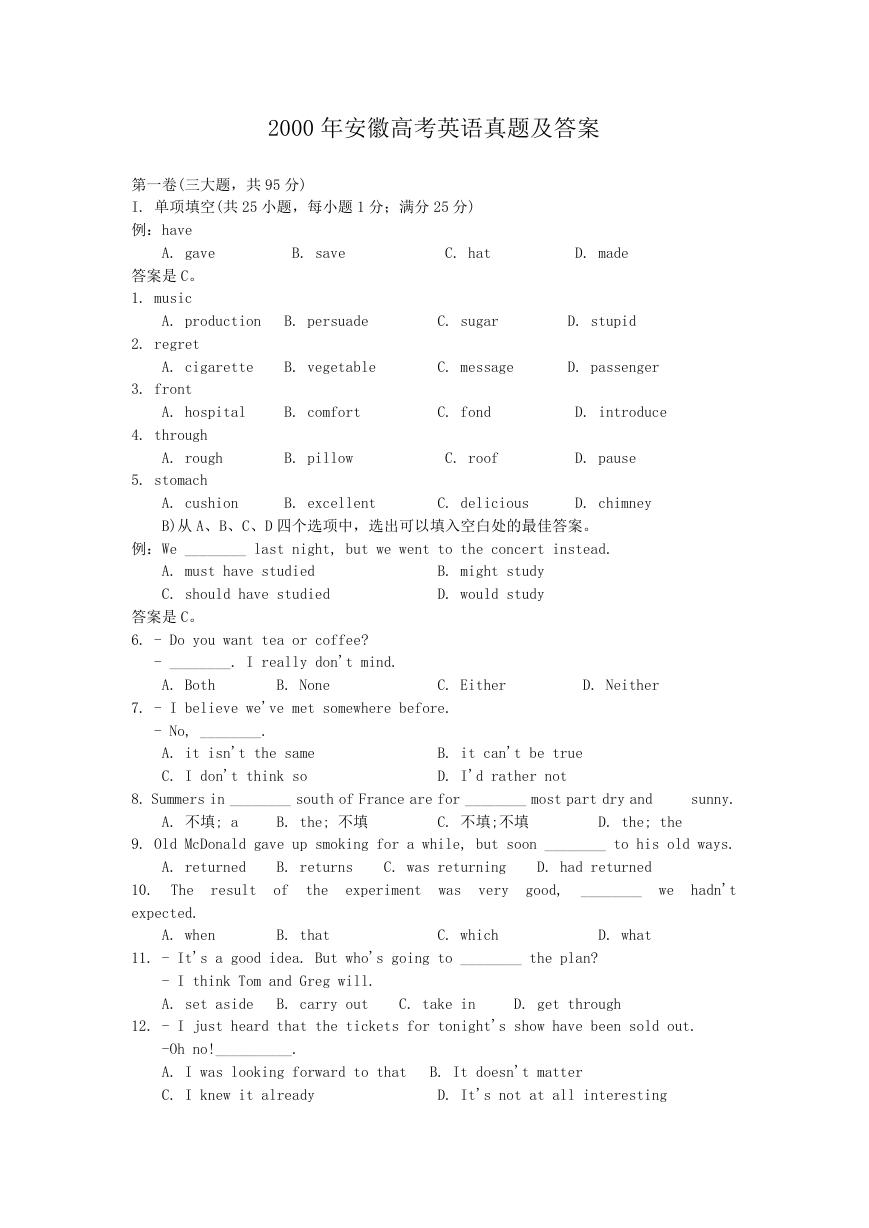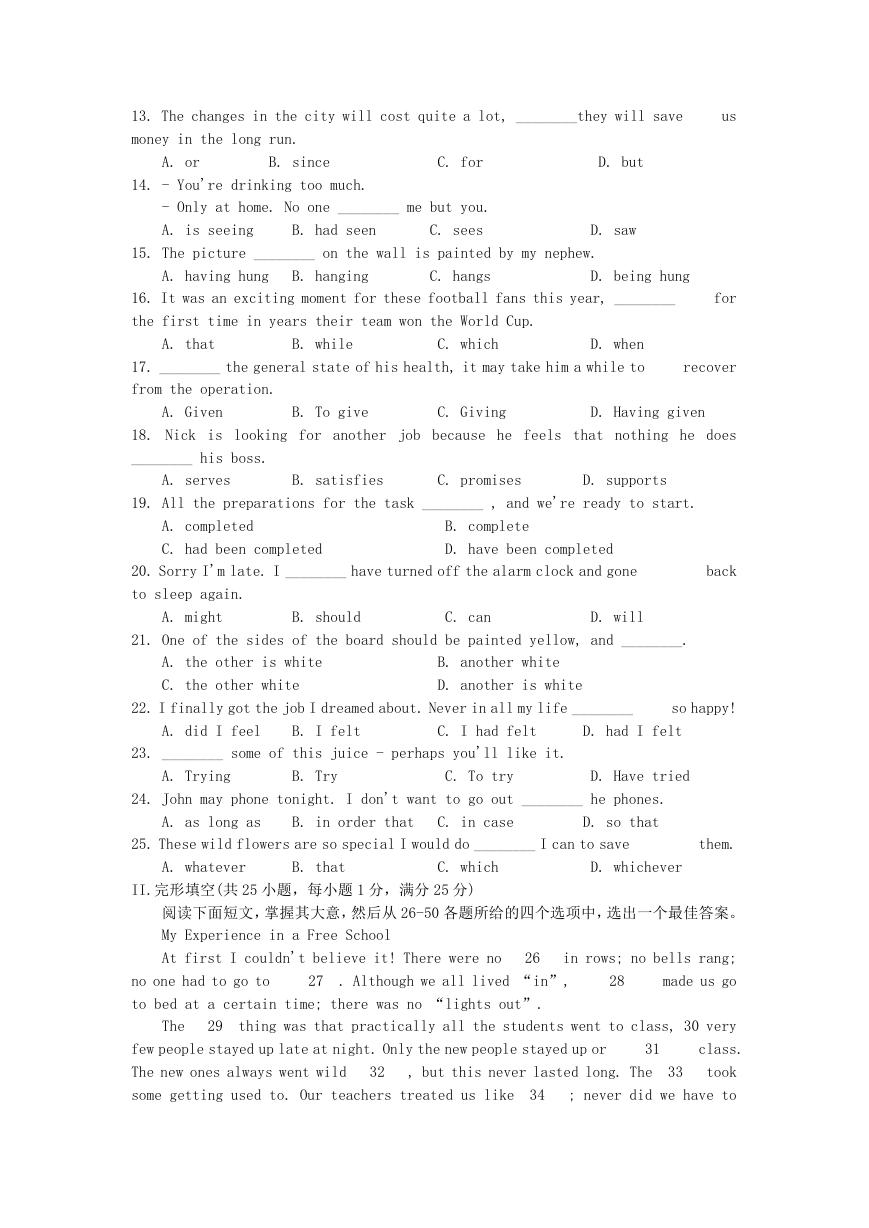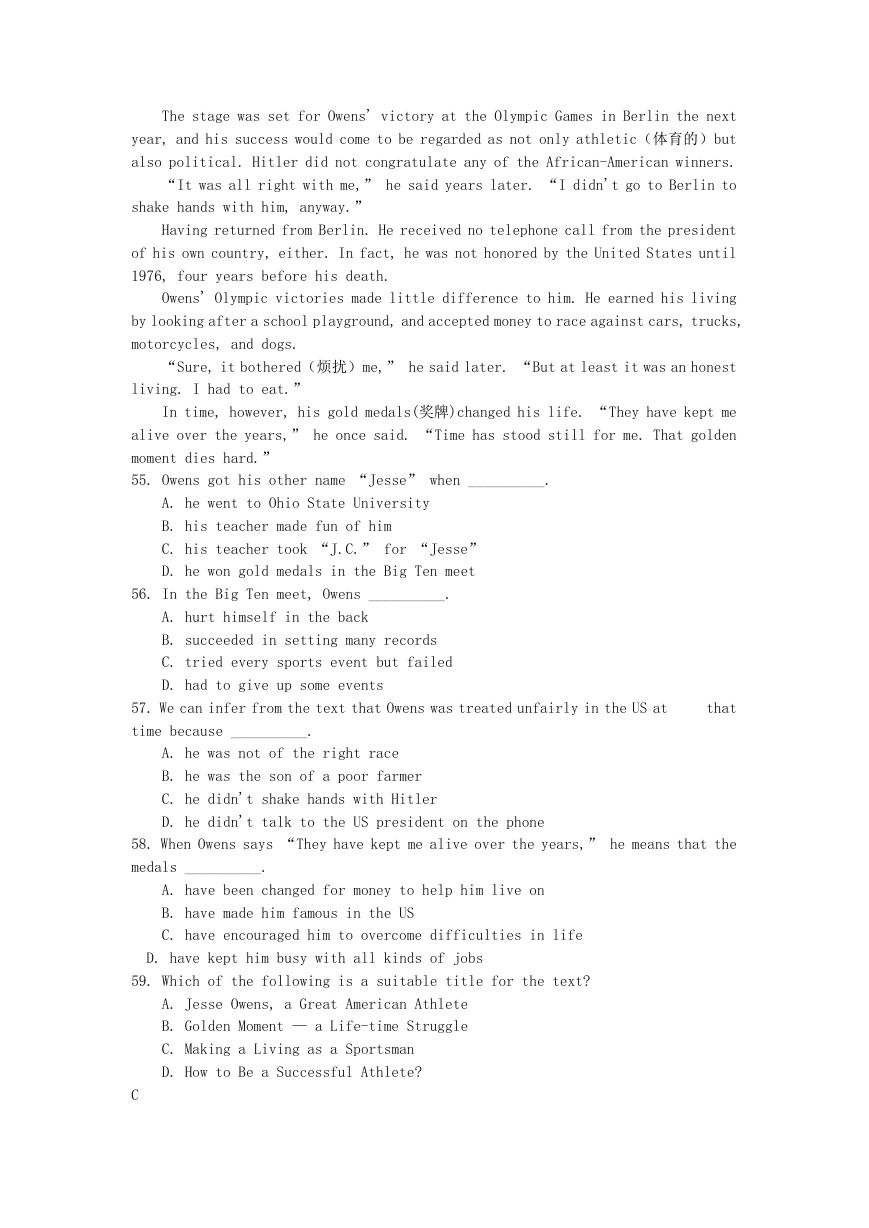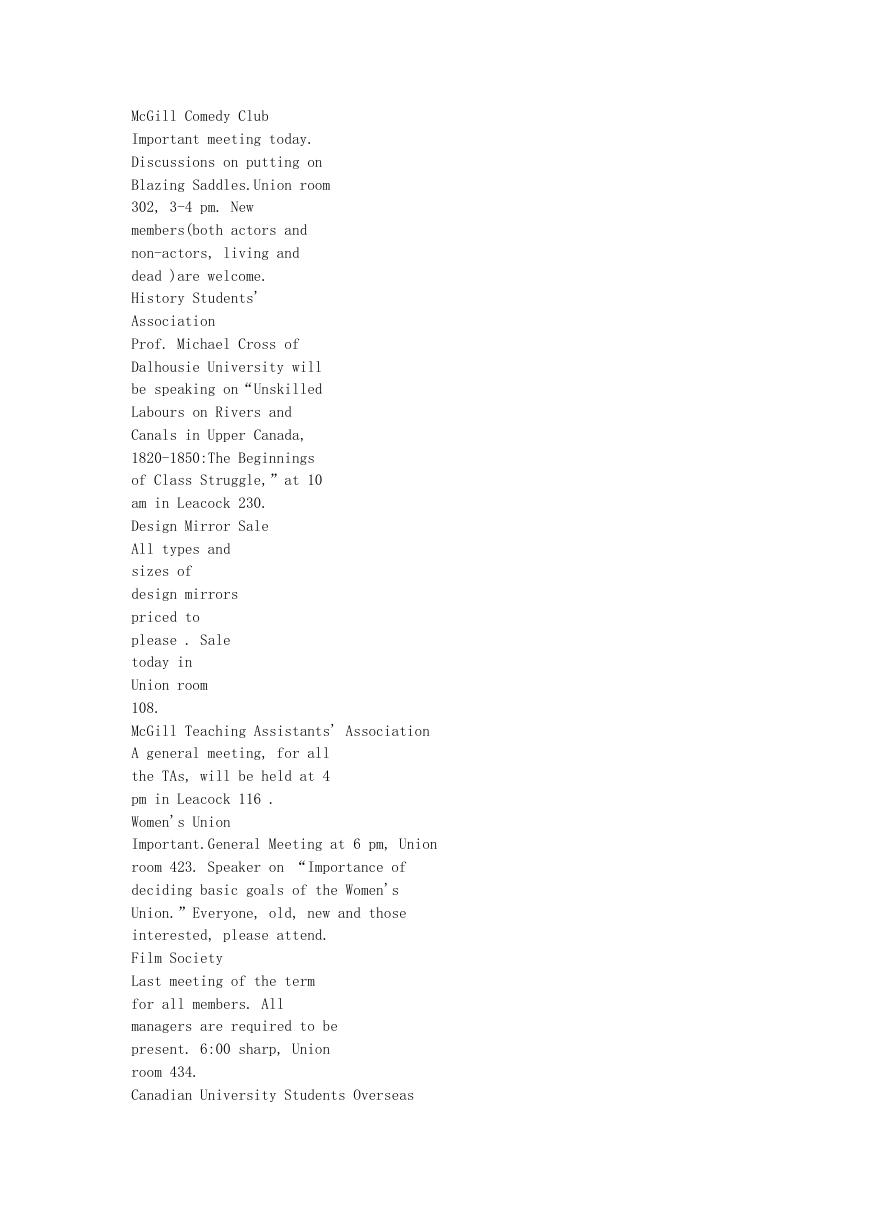2000 年安徽高考英语真题及答案
第一卷(三大题,共 95 分)
I. 单项填空(共 25 小题,每小题 1 分;满分 25 分)
例:have
A. gave
B. save
C. hat
D. made
答案是 C。
1. music
A. production
B. persuade
C. sugar
D. stupid
2. regret
A. cigarette
B. vegetable
C. message
D. passenger
3. front
A. hospital
B. comfort
C. fond
D. introduce
4. through
A. rough
B. pillow
C. roof
D. pause
5. stomach
A. cushion
B)从 A、B、C、D 四个选项中,选出可以填入空白处的最佳答案。
C. delicious
B. excellent
D. chimney
例:We ________ last night, but we went to the concert instead.
A. must have studied
C. should have studied
B. might study
D. would study
答案是 C。
6. - Do you want tea or coffee?
- ________. I really don't mind.
A. Both
B. None
C. Either
D. Neither
7. - I believe we've met somewhere before.
- No, ________.
A. it isn't the same
C. I don't think so
B. it can't be true
D. I'd rather not
8. Summers in ________ south of France are for ________ most part dry and
sunny.
A. 不填; a
B. the; 不填
C. 不填;不填
D. the; the
9. Old McDonald gave up smoking for a while, but soon ________ to his old ways.
A. returned
10.
The
expected.
result
B. returns
of
the
C. was returning
very
was
experiment
D. had returned
good,
________
we
hadn't
A. when
B. that
C. which
D. what
11. - It's a good idea. But who's going to ________ the plan?
- I think Tom and Greg will.
B. carry out
A. set aside
C. take in
D. get through
12. - I just heard that the tickets for tonight's show have been sold out.
-Oh no!__________.
A. I was looking forward to that
C. I knew it already
B. It doesn't matter
D. It's not at all interesting
�
13. The changes in the city will cost quite a lot, ________they will save
money in the long run.
us
A. or
B. since
C. for
D. but
14. - You're drinking too much.
- Only at home. No one ________ me but you.
A. is seeing
B. had seen
C. sees
D. saw
15. The picture ________ on the wall is painted by my nephew.
A. having hung
B. hanging
C. hangs
D. being hung
16. It was an exciting moment for these football fans this year, ________
the first time in years their team won the World Cup.
for
A. that
D. when
17. ________ the general state of his health, it may take him a while to
from the operation.
B. while
C. which
recover
A. Given
B. To give
C. Giving
D. Having given
18. Nick is looking for another job because he feels that nothing he does
________ his boss.
A. serves
B. satisfies
C. promises
D. supports
19. All the preparations for the task ________ , and we're ready to start.
A. completed
C. had been completed
B. complete
D. have been completed
20. Sorry I'm late. I ________ have turned off the alarm clock and gone
to sleep again.
back
A. might
B. should
C. can
D. will
21. One of the sides of the board should be painted yellow, and ________.
A. the other is white
C. the other white
B. another white
D. another is white
22. I finally got the job I dreamed about. Never in all my life ________
so happy!
A. did I feel
B. I felt
C. I had felt
D. had I felt
23. ________ some of this juice - perhaps you'll like it.
A. Trying
B. Try
C. To try
D. Have tried
24. John may phone tonight. I don't want to go out ________ he phones.
A. as long as
B. in order that
C. in case
D. so that
25. These wild flowers are so special I would do ________ I can to save
them.
A. whatever
B. that
C. which
D. whichever
II.完形填空(共 25 小题,每小题 1 分,满分 25 分)
阅读下面短文,掌握其大意,然后从 26-50 各题所给的四个选项中,选出一个最佳答案。
My Experience in a Free School
At first I couldn't believe it! There were no
26
in rows; no bells rang;
made us go
28
no one had to go to
to bed at a certain time; there was no “lights out”.
. Although we all lived “in”,
27
The
29
thing was that practically all the students went to class, 30 very
few people stayed up late at night. Only the new people stayed up or
The new ones always went wild
some getting used to. Our teachers treated us like
class.
took
; never did we have to
, but this never lasted long. The
31
32
34
33
�
35 “stand up”, “sit down”, “speak out”. I don't
try his best.
36
one student who didn't
39
in winter we each studied a few
The subjects were the same as those in 37 school, but what a difference in the
approach(方式)!For example, in botany(植物学)we had 38 classes in the spring
two gardens, a vegetable garden and a flower garden.
or fall, but instead we
things about what we had grown. In math
40
the students built three different kinds of storerooms - small ones
, but
usable. They did this instead of having lessons in the classroom. They really had
a
the angles
(角度)and so on. I didn't take
. I can't stand it! Besides, I could do the
basic things with numbers. That's
time too, designing everything, drawing the blueprints,
41
42
44
45
46
43
!
49
.
C. once more
47
I think I am a
48
D. studied
D. just then
D. buildings
D. work
D. parents
D. strange
D. yet
C. students
C. class
C. teachers
C. good
C. so
C. missed
person for having gone to the school. I can read
and write as well as anyone else my age, and I can think better. That's probably
a real big
between the free school and regular school-the amount of
50
26. A. desks
27. A. home
28. A. anybody
29. A. sad
30. A. and
31. A. attended
32. A. from then on
33. A. freedom
34. A. workers
35. A. understand
36. A. hear from
37. A. night
38. A. all
39. A. planted
40. A. Still
41. A. wild
42. A. as well
43. A. funny
44. A. looking out
45. A. math
46. A. dull
47. A. On the whole B. Once again
48. A. careful
49. A. problem
50. A. reading
III.阅读理解(共 25 小题,A 节每小题 2 分,B 节每小题 1 分;满分 45 分)
B. lights
B. bed
B. nobody
B. last
B. but
B. took
B. at first
B. habit
B. pupils
B. study
B. feel like
B. regular
B. short
B. studied
B. Then
B. successful
B.after a while
B. great
B. taking out
B. care
B. interesting
C. small
C. no
C. drew
C. Yet
C. usual
C. of course
D. particular
D. as a result
D. thoughtful
D. figuring out
C. time
C. gardeners
C. play
C. think about
C. busier
C. difference
C. teaching
B. better
B. chance
B. gardening
D. lovely
D. change
D. thinking
C. Sooner or later D. After a while
C. convenient
C. finding out
D. people
D. grown-ups
D. notice
D. dangerous
C. botany
C. enough
D. say
D. know of
D. real
D. indoor
D. toured
D. Next
A) 阅读下列短文,从每题所给的四个选项中,选出一个最佳答案。
A
The Channel Islands are a group of British-owned islands lying in the English
�
Channel(海峡), 10 to 30 miles off the French coast, and 70 to 90 miles from the English
coast. There are ten islands with a total land area of 75 square miles and a total
population of 123,000. The three largest islands, Jersey, Guernsey, and Alderney,
have long been known for the fine breeds(品种)of cattle that are raised on them and
named after them.
In earliest known history the islands were considered part of Normandy, which
was part of France, but the ruler of Normandy became king of England in 1066, and
from then on the islands were looked upon as British land. English control was
unbroken until World War II, when the Germans held the islands for five years.
Although people on the islands speak both languages and they are considered
English, their customs are more French than English.
51. Which of the following maps gives the right position of the Channel Islands?
Br = Britain
Fr = France
Ch = Channel Islands
52. Jersey, Guernsey, and Alderney breeds of cattle are __________.
A. considered best in England
B. named after their birthplaces
C. brought to the islands by the Germans
D. raised on well-known farms by the French
53. The Channel Islands have been continuously under British rule since
__________.
A. earliest known history
B. 1066
C. 1930s
D. the end of World War II
54. Why do people on the Channel Islands follow French way of living?
A. Their islands used to be part of France.
B. Their islands are often visited by the French.
C. They came from France.
D. They speak French.
B
James Cleveland Owens was the son of a farmer and the grandson of black slaves.
His family moved to Cleveland when he was 9. There, a school teacher asked the youth
his name.
“J.C.” ,he replied.
She thought he had said “Jesse”, and he had a new name.
Owens ran his first race at age 13. After high school, he went to Ohio State
University. He had to work part time so as to pay for his education. As a second-year
student, in the Big Ten games in 1935, he set even more records than he would in
the Olympic Games a year later.
A week before the Big Ten meet, Owens accidentally fell down a flight of stairs.
His back hurt so much that he could not exercise all week, and he had to be helped
in and out of the car that drove him to the meet. He refused to listen to the
suggestions that he give up and said he would try, event by event. He did try, and
the results are in the record book.
�
The stage was set for Owens' victory at the Olympic Games in Berlin the next
year, and his success would come to be regarded as not only athletic(体育的)but
also political. Hitler did not congratulate any of the African-American winners.
“It was all right with me,” he said years later. “I didn't go to Berlin to
shake hands with him, anyway.”
Having returned from Berlin. He received no telephone call from the president
of his own country, either. In fact, he was not honored by the United States until
1976, four years before his death.
Owens' Olympic victories made little difference to him. He earned his living
by looking after a school playground, and accepted money to race against cars, trucks,
motorcycles, and dogs.
“Sure, it bothered(烦扰)me,” he said later. “But at least it was an honest
living. I had to eat.”
In time, however, his gold medals(奖牌)changed his life. “They have kept me
alive over the years,” he once said. “Time has stood still for me. That golden
moment dies hard.”
55. Owens got his other name “Jesse” when __________.
A. he went to Ohio State University
B. his teacher made fun of him
C. his teacher took “J.C.” for “Jesse”
D. he won gold medals in the Big Ten meet
56. In the Big Ten meet, Owens __________.
A. hurt himself in the back
B. succeeded in setting many records
C. tried every sports event but failed
D. had to give up some events
57. We can infer from the text that Owens was treated unfairly in the US at
time because __________.
that
A. he was not of the right race
B. he was the son of a poor farmer
C. he didn't shake hands with Hitler
D. he didn't talk to the US president on the phone
58. When Owens says “They have kept me alive over the years,” he means that the
medals __________.
A. have been changed for money to help him live on
B. have made him famous in the US
C. have encouraged him to overcome difficulties in life
D. have kept him busy with all kinds of jobs
59. Which of the following is a suitable title for the text?
A. Jesse Owens, a Great American Athlete
B. Golden Moment — a Life-time Struggle
C. Making a Living as a Sportsman
D. How to Be a Successful Athlete?
C
�
McGill Comedy Club
Important meeting today.
Discussions on putting on
Blazing Saddles.Union room
302, 3-4 pm. New
members(both actors and
non-actors, living and
dead )are welcome.
History Students'
Association
Prof. Michael Cross of
Dalhousie University will
be speaking on“Unskilled
Labours on Rivers and
Canals in Upper Canada,
1820-1850:The Beginnings
of Class Struggle,”at 10
am in Leacock 230.
Design Mirror Sale
All types and
sizes of
design mirrors
priced to
please . Sale
today in
Union room
108.
McGill Teaching Assistants' Association
A general meeting, for all
the TAs, will be held at 4
pm in Leacock 116 .
Women's Union
Important.General Meeting at 6 pm, Union
room 423. Speaker on “Importance of
deciding basic goals of the Women's
Union.”Everyone, old, new and those
interested, please attend.
Film Society
Last meeting of the term
for all members. All
managers are required to be
present. 6:00 sharp, Union
room 434.
Canadian University Students Overseas
�
CUSO presents “Guess Who's Coming to
Breakfast”at 7 pm, Newman Centre,3484
Peel. Find out about CUSO here and
overseas. Everyone welcome.
60. Where can you probably find this text?
A. In a school magazine
B. In a national paper.
C. In a guide book.
D. In a university daily newspaper.
61. If you are interested in arts, where would you go for a visit?
A. Leacock 116.
C. Union room 108.
B. Union room 423.
D. Newman Centre, 3484 Peel.
62. Which of the following is the name of a play?
A. Blazing Saddles.
B. Guess Who's Coming to Breakfast.
C. Importance of deciding basic goals of the Women's Union.
D. Unskilled Labours on Rivers and Canals in Upper Canada, 1820 - 1850.
D
Fish Ears Tell Fish Tales
Fish have ears. Really. They're quite small and have no opening to the outside
world carrying sound through the body. For the past seven years, Simon Thorrold,
a university professor, has been examining fish ears, small round ear bones called
otoliths.
As fish grow, so do their otoliths. Each day, their otoliths gain a ring of calcium
carbonate(碳酸钙).By looking through a microscope(显微镜)and counting these rings,
Thorrold can determine the exact age of a young fish. As a fish gets older, its
otoliths no longer get daily rings. Instead, they get yearly rings, which can also
be counted, giving information about the fish's age, just like the growth rings of
a tree.
Ring counting is nothing new to fish scientists. But Thorrold has turned to a new
direction. They're examining the chemical elements(元素)of each otolith ring.
The daily ring gives us the time, but chemistry tells us about the environment
in which the fish swam on any given day. These elements tell us about the chemistry
of the water that the fish was in. It also says something about water temperature,
which determines how much of these elements will gather within each otolith ring.
Thorrold can tell, for example, if a fish spent time in the open ocean before
entering the less salty water of coastal areas. He can basically tell where fish
are spending their time at any given stage of history.
In tne case of the Atlantic croaker, a popular saltwater food fish, Thorrold and
his assistant have successfully followed the travelling of young fish from mid-ocean
to the coast, a journey of many hundreds of miles.
This is important to managers in the fish industry, who know nearly nothing about
the whereabouts of the young fish for most food fish in the ocean. Eager to learn
about his technology, fish scientists are now lending Thorrold their ears.
�
63. What can we learn about fish ears from the text?
A. They are small soft rings.
B. They are not seen from the outside.
C. They are openings only on food fish.
D. They are not used to receive sound.
64. Why does the writer compare the fish to trees?
A. Trees gain a growth ring each day.
B. Trees also have otoliths.
C. Their growth rings are very small.
D. They both have growth rings.
65. Why is it important to study the chemistry of otolith rings?
A. The elements of the otoliths can tell the history of the sea.
B. Chemical contents of otoliths can tell how fast fish can swim.
C. We can know more about fish and their living environment.
D. Scientists can know exactly how old a fish is.
66. How would you understand “fish scientists are now lending their ears”?
A. They are very interested in Thorrold's research findings.
B. They want to know where they can find fish.
C. They lend their fish for chemical studies.
D. They wonder if Thorrold can find growth rings from their ears.
E
The United States:
Fliers may want to have their tickets in hand before catching
their planes, but the airline companies are doing everything they can to bring
forward cost-saving ticketless flight- no paper needed, just a ticket number and
a photo ID(带照片的身份证). Anyone who buys a Northwest E-ticket through the
airline's computer service by June 16 will get an award(奖励). Next time you fly,
you can buy another ticket for a friend for $99, good anywhere in the US or Canada
through Feb. 12, 2000, along with the lowest ticket prices. Some airlines offer extra
frequent-flier miles for the ticketless crowd. And there are rising punishments for
paper lovers. American, Northwest, United, and last week, US Airways have raised
the cost for lost-ticket replacement(替换)to $70 from either $60 or $50 . The
airlines insist that the increase in price is not meant to push travelers toward
E-tickets but only covers the increasing cost of replacing and tracking a missing
ticket.
67. Why is the new ticketless flight introduced?
A. It is cheaper for air travelers.
B. It helps reduce the cost for airlines.
C. It can use computer to plan air traveling.
D. It helps prevent fliers from losing their tickets.
To
68.
___________.
encourage
people
to
take
ticketless
flights,
the
airlines
A. sell their tickets for $99 from June to February the following year
B. let travelers go to both the US and Canada with the same tickets
C. allow each traveler to have an extra $99 ticket for a friend of
�
















 2023年江西萍乡中考道德与法治真题及答案.doc
2023年江西萍乡中考道德与法治真题及答案.doc 2012年重庆南川中考生物真题及答案.doc
2012年重庆南川中考生物真题及答案.doc 2013年江西师范大学地理学综合及文艺理论基础考研真题.doc
2013年江西师范大学地理学综合及文艺理论基础考研真题.doc 2020年四川甘孜小升初语文真题及答案I卷.doc
2020年四川甘孜小升初语文真题及答案I卷.doc 2020年注册岩土工程师专业基础考试真题及答案.doc
2020年注册岩土工程师专业基础考试真题及答案.doc 2023-2024学年福建省厦门市九年级上学期数学月考试题及答案.doc
2023-2024学年福建省厦门市九年级上学期数学月考试题及答案.doc 2021-2022学年辽宁省沈阳市大东区九年级上学期语文期末试题及答案.doc
2021-2022学年辽宁省沈阳市大东区九年级上学期语文期末试题及答案.doc 2022-2023学年北京东城区初三第一学期物理期末试卷及答案.doc
2022-2023学年北京东城区初三第一学期物理期末试卷及答案.doc 2018上半年江西教师资格初中地理学科知识与教学能力真题及答案.doc
2018上半年江西教师资格初中地理学科知识与教学能力真题及答案.doc 2012年河北国家公务员申论考试真题及答案-省级.doc
2012年河北国家公务员申论考试真题及答案-省级.doc 2020-2021学年江苏省扬州市江都区邵樊片九年级上学期数学第一次质量检测试题及答案.doc
2020-2021学年江苏省扬州市江都区邵樊片九年级上学期数学第一次质量检测试题及答案.doc 2022下半年黑龙江教师资格证中学综合素质真题及答案.doc
2022下半年黑龙江教师资格证中学综合素质真题及答案.doc